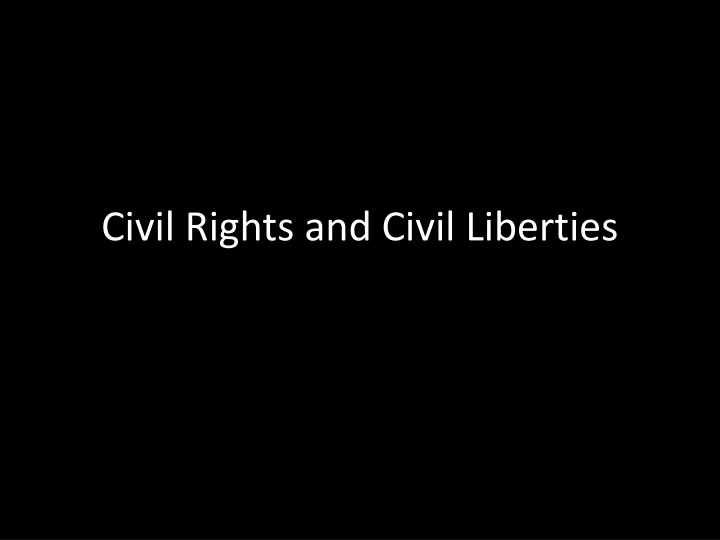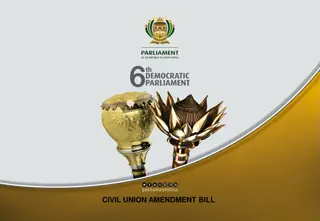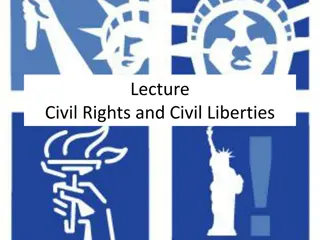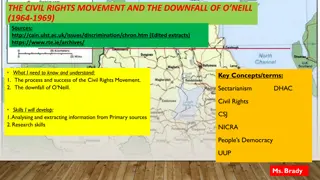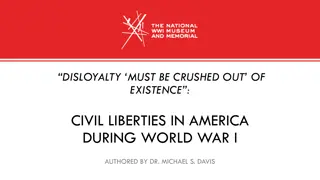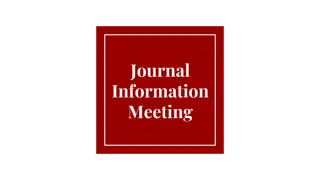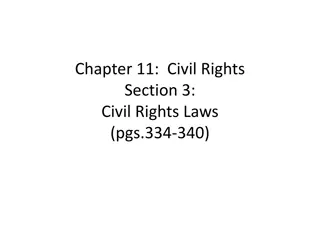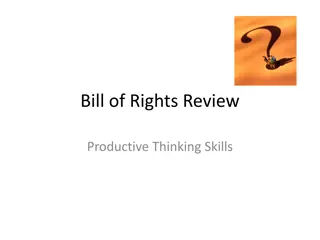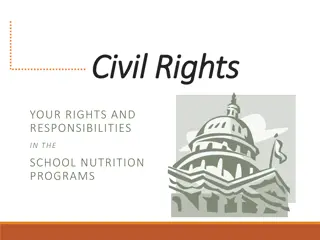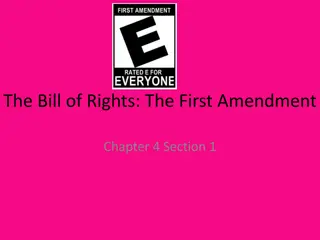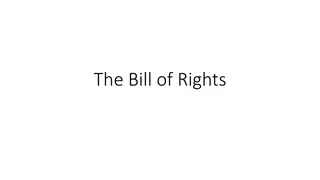Civil Liberties and First Amendment Rights
Exploring civil liberties and First Amendment freedoms, including the protections against government actions, particularly in relation to religion and speech. Key topics covered include the Establishment Clause, Separation of Church and State, freedom of speech and press, and limitations on freedom of speech and press such as obscene material and false advertising.
Download Presentation

Please find below an Image/Link to download the presentation.
The content on the website is provided AS IS for your information and personal use only. It may not be sold, licensed, or shared on other websites without obtaining consent from the author.If you encounter any issues during the download, it is possible that the publisher has removed the file from their server.
You are allowed to download the files provided on this website for personal or commercial use, subject to the condition that they are used lawfully. All files are the property of their respective owners.
The content on the website is provided AS IS for your information and personal use only. It may not be sold, licensed, or shared on other websites without obtaining consent from the author.
E N D
Presentation Transcript
SSCG7 Demonstrate knowledge of civil liberties and civil rights. 7a. Define civil liberties as protections against government actions (e.g., First Amendment).
Civil Liberties Protections against government actions Most of these are found in the Bill of Rights, especially in the First Amendment
First Amendment Freedoms: Religion Establishment Clause: government can t take actions that create an official religion or favor one religion over another
First Amendment Freedoms: Religion Separation of church and State : this statement comes from a Thomas Jefferson letter & expresses his defense of the 1stAmendment (not in the Constitution!) Earlier courts interpreted Jefferson s words to indicate that the government was not to interfere with the religious expression unless it violated peace & good order
First Amendment Freedoms: Religion Separation of church and state cont.: Later courts have used the establishment clause and Jefferson s words to strike down many state laws that encourage or facilitate public religious expression Establishment clause issues: Public religious displays Prayer in public schools Public funding for religious schools Polygamy Patriotism School attendance
First Amendment Freedoms: Speech & Press To participate in government, citizens must have full access to a full range of opinions, beliefs, information Freedoms of speech/press protect unpopular ideas
First Amendment Freedoms: Speech & Press Limiting Freedom of speech & press: Obscene material (What is obscene?) False advertising Speech that harms others (falsely shouting fire in a crowded theater) Slander: a spoken defamatory statement Libel: a printed defamatory statement Issues of national security Treason: making war against the US or giving aid to its enemies Sedition: speech/actions inspiring revolt against the government
First Amendment Freedoms: Speech & Press Alien & Sedition Acts (1798): supposed to protect the US from domestic dissent during war but seen as silencing Dem.-Rep.; mostly repealed Clear & present danger :speech can be limited if is causes an outcome the government has right to prevent (Schenck v. US, Abrams v. US, Whitney v. Cal., Brandenburg v. Ohio)
Freedom of the Press A free press is important to the spread of information & ideas Government has to balance need for free press with others rights & national security Radio & TV broadcasting are more regulated by government (FCC) than print media Cable systems have greater freedom than broadcasters as they do not use public airwaves The internet is also less subject to government regulation
Freedom of the Press Prior restraint: government action to prevent material from being published Near v. Minnesota (1931): Court ruled that prior restraint is almost always unconstitutional New York Times Co. v. US (1971): In this case, government could not prove that publishing certain material was a threat national security
Freedom of Speech: Symbolic speech: communication of ideas through words or actions Court has held that some symbolic speech deserves protection if it does not threaten property or public order Stromberg v. Cal. (1931): ruled a state law prohibiting a red flag was unconstitutional Tinker v. Des Moines ICDS (1969): students wearing black armbands to protest Vietnam War was free speech Texas v. Johnson (1989): even though it is offensive, burning a US flag was free symbolic speech
Freedom of Assembly People have the right to meet together to express their view peacefully DeJonge v. Oregon (1937): ruled that a meeting of the Communist party was legal if no illegal actions were discussed; incorporated freedom of assembly into the 14thAmendment
Freedom of Petition Government cannot interfere with the right of the people to ask the government for relief from unfair treatment Edwards v. S. Carolina (1963): Court ruled that African American students had the right to peaceably protest racial injustice
2ndAmendment: the Right to Keep & Bear Arms Originally to protect states rights to form militias & ease fears of a federally controlled standing army Some believe it protects individual rights to own any kind of firearm US v. Miller (1939): 2ndAmendment not meant to protect rights to all types of weapons, just those that might be used in a militia D.C v. Heller (2008): does protect some individual rights to own guns but government can impose reasonable restrictions
3rdAmendment: No Quartering of Troops Keeps the government from housing troops in private homes without the owners consent & due process Included in the Bill of Rights since this was a major problem colonists had with the British Army & a complaint listed in the Declaration of Independence Largely forgotten today & never the subject of a Supreme Court case Not incorporated into the 14thAmendment
Which Civil Liberty Applies? Scenarios: 1. The City of Macon is sued for displaying a nativity in front of city hall during Christmas. 2. President Obama requires that private citizens house national guard troops who are helping with tornado disaster relief 3. A man carries a gun into a public park without a permit. 4. The county expands a busy road without consent of property owners and does not allow them to ask the government for relief from unfair treatment 5. As part of the healthcare law, Christian businesses must pay for coverage of abortions & other birth control to which they are opposed
4thAmendment: Searches, Seizures, & Arrests Prohibits the government from illegal arrests or searching/seizing private property without a search warrant Can enter property in emergencies but only search for evidence related to the crime being investigated; other evidence can be seized but only if in plain view Weeks v. US (1914):evidence obtained illegally may not be used against a person in court (exclusionary rule)
4thAmendment: Searches, Seizures, & Arrests Mapp v. Ohio (1961): expanded exclusionary rule to include state actions
4thAmendment: Searches, Seizures, & Arrests Pedestrians & Cars: Police can stop people on the street or vehicles if there is reasonable suspicion: If they are acting oddly If they have committed a traffic violation Police can search for hidden weapons or search vehicles without a warrant and seize plain view evidence
4thAmendment: Searches, Seizures, & Arrests 4thAmendment protects a person s paper so it has been applied to telephone, telegraph, & internet communications Katz v. US (1967): wiretapping constitutes an illegal search without a warrant USA Patriot Act: parts of it struck down as it gave too much power to search phone/internet records without court oversight
4thAmendment: Searches, Seizures, & Arrests Drug Testing: Does it violate personal security/privacy? Private employers have wide freedom to test workers to discourage drug use Government is limited in its ability to test for drugs the can t test everybody Governments can test employees whose jobs affect public safety pilots, mechanics, bus/truck drivers, railroad workers
4thAmendment: Searches, Seizures, & Arrests Public school students have fewer 4thAmendment protections than the general population! Why? Students have rights to privacy but schools must ensure safe learning environments searching for drugs & weapons N.J. v. T.L.O. (1985): court allowed search of a student s purse without probable cause Vernonia SD v. Acton(1995): schools can randomly test athletes for drug use Pottawatomie Co. v. Earls (2002): extended Vernonia ruling to include drug testing for students in extracurricular activities
5thAmendment The 5thAmendment provides protections for those accused of crimes Requires indictment by a grand jury before having to stand trial No double jeopardy (being tried twice for the same crime ) You can t be required to be a witness against yourself Due process Government can t take your property without just compensation (imminent domain)
6thAmendment Requires a speedy, public jury trial The accused must be informed of charges against them The accused must be allowed to question those who have accused them The accused must be allowed a way to obtain witnesses in their favor The accused must have the opportunity to have a lawyer to defend them if they want one
7thAmendment Allows for jury trials in civil cases in which the controversy exceeds $20 Only applies to federal courts but most states constitutions include this as well
8thAmendment Courts cannot require excessive bail or fines No cruel & unusual punishment can be inflicted This does not mean that the death penalty can t be applied
9th& 10thAmendment 9th: Just because an individual right such as watching TV is not listed in the U.S. Constitution does not mean the government can take that right away. 10th: Guarantees that any power not specifically given to the federal government in the Constitution is given to (reserved) to the states or the people Reserved Power aren t specified but the Supreme Court has ruled that laws affecting family relations (such as marriage, divorce, and adoption), intrastate commerce, and local law enforcement activities, are among those specifically reserved to the states or the people.
7c. Analyze due process of law as expressed in the 5th and 14th amendments, as understood through the process of incorporation.
Due Process 5thAmendment prevents the federal government from depriving anyone of life, liberty, or property (especially in the Bill of rights) without due process (established/complete legal procedures) 14thAmendment: due process clause guarantees much of the Bill of Rights applies to states as well (selective incorporation or process of incorporation)
5th/14thAmendments: Due Process Procedural Due Process: the government must follow certain procedures before punishing a person (Are legal procedures fair?) This right can be limited if the government has strong reason to do so Mackey v. Montrym (1979): court upheld revoking a drivers license when the driver refused to take an alcohol test. The state penalized people without finding them guilty The state s interest in getting drunk drivers off the road was strong enough to deny due process
5th/14thAmendments: Due Process Substantive Due Process: the idea that laws themselves must be fair & just since people have unalienable rights. (Are laws fair?) Slaughterhouse Cases (1873): ruled to allow 1 slaughterhouse to operate in a part of Louisiana Dissenting opinion said this was unconstitutional because it violated substantive due process by not allowing butchers to work This dissent later became the basis for defining due process in the future
Rights Incorporated in the 14th Amendment to apply to states 1stAmendment: establishment/free exercise of religion, speech, press, assembly, petition 2ndAmendment 4thAmendment 5thAmendment: double jeopardy, self- incrimination, imminent domain, due process 6th: trial by jury, face accuser, lawyer, obtain witness, notice of charges 8th: cruel/unusual punishment
Discussion: Why do you think that Amendment like the 3rdand 7thhave not been incorporated into the 14thAmendment due process clause (applied to the states)?
7b. Define civil rights as equal protections for all people (e.g., Civil Rights Act, Brown v.Board of Education, etc.)
Civil Rights Defined as equal protections for all people Examples: Freedom from discrimination regardless of race, ethnicity, sex, religion, age, national origin, etc. Equal opportunities to vote & run for political office, etc. (ability to influence/change government)
Discrimination in U.S. History African Americans: Over 250 years of slavery with violence, forced labor, separation from family/culture Viewed as property, not citizens (Dred Scott decision) 13th& 14thamendments ended slavery & gave citizenship/voting rights but were still denied rights through threats, attacks, & local laws
Discrimination in U.S. History Native Americans: Pushed off lands as European then U.S. settlers advanced westward Population weakened by diseases from Europe U.S. government violation of treaties Forced onto reservations Forced to give up language & culture http://griid.files.wordpress.com/2012/05/trailoftears.jpg?w=300h=281
Discrimination in U.S. History Asian Americans: Chinese immigrants in the mid-1800 s were discriminated against with jobs, housing, access to public service Chinese Exclusion Act (1882) Japanese internment during World War II
Discrimination in U.S. History Mexican Americans in newly acquired territories in the West (like TX, CA) in the 1840 s sometimes had land taken and were forced to live in separate communities Hispanic immigrants from Mexico, Puerto Rico, & Cuba have also faced discrimination as a result of their different culture
Discrimination in U.S. History Women: Not given right to vote until 1920 Could not serve on juries, unequal property/custody rights Were considered socially inferior by some (expected to be mothers/homemakers) Fewer opportunities for education/jobs/equal pay
Equal Protection of the Law 14thAmendment Equal Protection Clause: states must apply the law the same way for one person as they would for any other person under the same circumstances Originally for protection of newly freed former slaves; now a main source of civil rights protection
Reasonable Distinction The government can distinguish/discriminate between different groups if it has a good reason Example: Government charges visitor fees at state parks visitors must pay; non-visitors don t have to However, the government must charge fees for all visitors, not just those with green eyes or black hair Federal Courts use three tests to determine if distinctions made by government are fair: Rational basis Intermediate scrutiny Strict Scrutiny
Rational Basis Test Treating groups differently is valid if the law in question establishes reasonable methods of accomplishing a legitimate government goal Example: States have established a minimum driving age of 16 since people below that age may not have the maturity/experience to drive safely The legitimate goal of government is to ensure public safety so the government can treat people of different age differently
Intermediate Scrutiny Test The challenged law must further an important government interest by means that are substantially related to that interest. More strict than rational basis Often used for classifications based on sex. Men & women are treated differently in military matters such as only requiring men to register for selective service
Strict Scrutiny Test Government must show that a law classifying a group of people is a compelling reason to accomplish a legitimate role of government Applied when: Fundamental rights are restricted (free speech, vote) Classification is based on race or national origin (called suspect classification)
